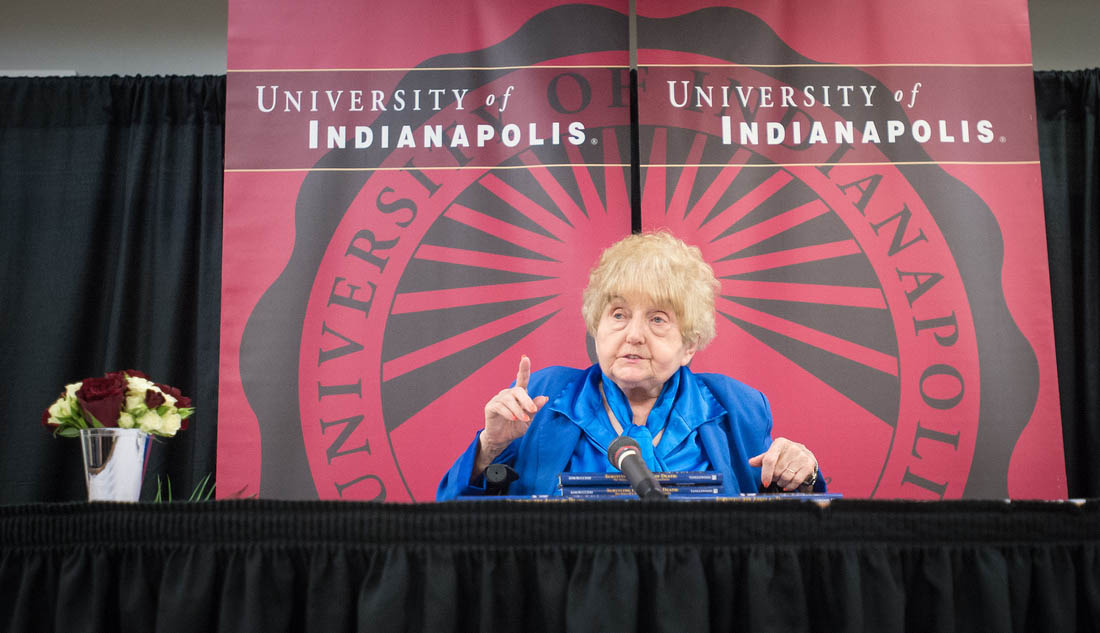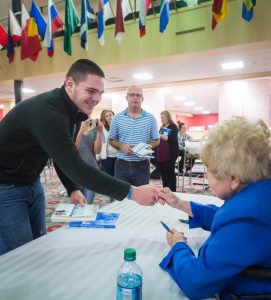Holocaust survivor offers inspiration, humor
 Human rights advocate Eva Kor speaks Tuesday in UIndy Hall.
Human rights advocate Eva Kor speaks Tuesday in UIndy Hall.
Eva Kor held her audience’s attention for 90 minutes Tuesday with a story of tragedy and redemption that was punctuated with a surprising amount of humor.
“I am a survivor of Auschwitz, a survivor of medical experiments by Dr. Josef Mengele, and now that I’m 81 years old, I’m trying to survive old age,” she said, drawing the first of many laughs from the several hundred attendees in UIndy Hall.
Delivering the university’s annual Interfaith Lecture – her 173rd presentation this year – the founder of Terre Haute’s CANDLES Holocaust Museum shared life lessons about the dangers of prejudice, “a cancer of the human soul,” and the vital importance of forgiveness, which she calls “the seed of peace.”
“Forgiveness is the best revenge,” she said in her Romanian accent, “because from the moment you forgive, the perpetrator no longer has any power over your life.”
She had plenty to forgive, and the perpetrator in her case was notorious.
Kor was just 10 years old in the spring of 1944 when her Jewish family was rounded up and packed into a cattle car for a four-day train trip to Auschwitz concentration camp in Poland. Almost immediately on arrival, she and her twin sister, Miriam, were singled out for special attention, and they never saw their parents and older sisters again.
The girls were placed with other young twins in a filthy barracks, where they had to guard their meager rations from the rats. Seeing children’s corpses on the latrine floor, the spirited and defiant Kor vowed that she and her sister would not meet the same fate, though that would prove a challenge. Dr. Mengele visited the barracks every morning but Sunday, to see “how many guinea pigs he had today.”
Three days a week, the twins were herded into an examination room and forced to wait naked for hours to be prodded and measured. On alternate days, they were taken to the “blood lab,” where large samples were drawn from one arm while unknown pathogens were injected into the other.
“The content of those injections we didn’t know then and we don’t know today,” Kor said. She blames the treatment for kidney problems that plagued her sister throughout life, leading to a donated kidney from Eva, and for Miriam’s eventual death from cancer in 1993.
Somehow, by will and instinct, the two survived long enough for the camp’s liberation by Soviet troops in 1945. Out of 1,500 sets of twins subjected to Mengele’s experiments, they were among just 250 individuals who survived, Kor said.
After the war, she lived for a time with relatives in Romania, then moved to Israel where she was schooled and served in the military. She met husband, a Buchenwald camp survivor, and in 1960 moved to his adopted home of Terre Haute.
“I came from Tel Aviv to Terre Haute,” she said. “That’s a pretty big jump.”
Though Kor began giving public lectures on her experience in 1978, she kept her memories and emotions at a distance, as if she was describing the experience of some other little girl. It was during one talk in the mid-1980s that she was overcome with emotion and began coming to grips with the full experience.
“The tears didn’t start coming until 1985,” she said. “That little girl and me became one. I could feel all the horror.”
Not until that point did Eva and Miriam actually discuss their horrific camp experiences with one another, after decades of silence on the topic. They founded Children of Auschwitz Nazi Deadly Lab Experiments Survivors, an effort to reunite surviving Mengele twins around the world. In 1995, Kor founded her Terre Haute museum, where she still gives tours.
Around the same time, she became acquainted with Hans Munch, another Auschwitz doctor who had been tormented by memories of the camp’s deadly gas chambers. In 1995, they traveled to Auschwitz to mark the 50th anniversary of the camp’s liberation. As agreed in a previous discussion, he signed an affidavit attesting to the horrors of the camp, and she presented him with a letter of forgiveness.
“I immediately felt that all the pain I carried with me for 50 years was no longer on my shoulders,” she recalled. “I was free of Auschwitz, and I was free of Mengele.”

Kor still advocates forgiveness and warns against prejudice, which can be as harmless as her own distaste for today’s youth fashions (“The worst in the world in that area is the baggy pants”) or as troubling as the racist sentiments arising amid the ongoing refugee crisis in Europe. The widespread economic unrest in the world reminds her of the conditions that brought Hitler to power.
“If you want to understand how World War II and the Holocaust happened, please look around,” she said.
And before ending her narrative to field questions and sign books, she offered this:
“Congratulations — you survived my lecture.”
More information on Eva Kor and the CANDLES museum is available at www.candlesholocaustmuseum.org.
